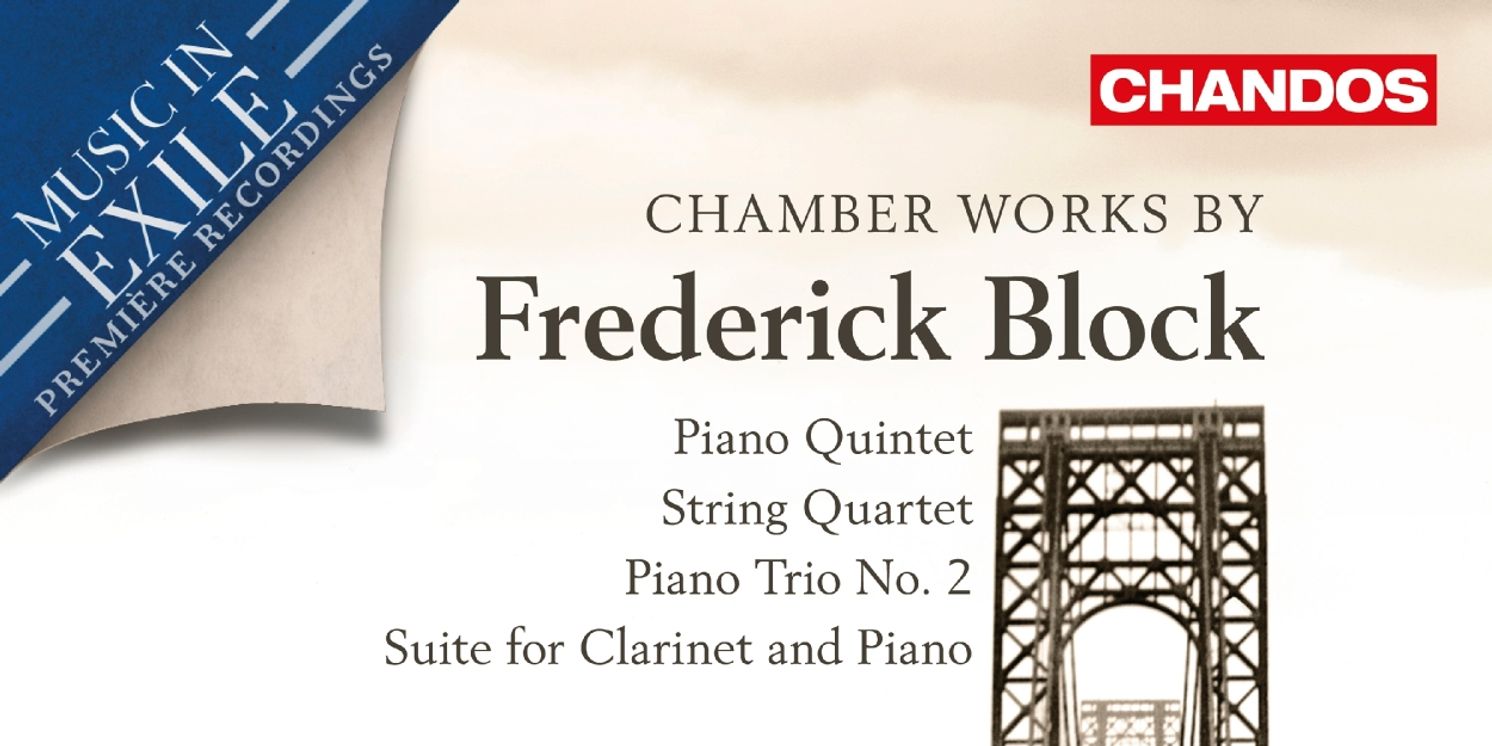ARC Ensemble Releasing New Collection of Work by Composer Frederick Block
The recording will be available on Friday, October 25.

Frederick Block (1899-1945) was on the brink of an auspicious European career when his future was shattered by the Nazi’s annexation of Austria in 1938. His brief exile in New York was tortured by recurring premonitions of his imminent death, which prompted a resolute quest to set down as many works as possible in the time he had left. On June 1, 1945, the premonitions fulfilled their promise, and his extraordinary legacy has remained unexplored since his death. For the eighth of its highly regarded “Music in Exile” recordings for Chandos, the ARC Ensemble (Artists of the Royal Conservatory) turns its attention to this forgotten Viennese émigré.
Nominated for multiple Grammy, JUNO and OPUS Klassik Awards, the ARC Ensemble is devoted to righting sins of omission, unearthing 20th century music suppressed or marginalized as a result of political and racial discrimination. The Chamber Works by Frederick Block (release date October 25, 2024) is the first commercial recording of this composer’s works; hidden gems that richly deserve inclusion in the mainstream classical repertoire.
“Of the many exiles we have investigated, Block’s story is among the most affecting, its poignancy deepened by the isolation of his final years, and the near total anonymity that followed his death,” says the ARC Ensemble’s Artistic Director Simon Wynberg. A musical archaeologist, Wynberg didn’t have to dig deep to find Block’s music, chancing on his name in the course of an online survey of the New York Performing Arts Library’s Special Collections. The composer was unknown to him, but Wynberg’s curiosity was piqued. Here was an abundance of intriguing and unknown chamber music, orchestral works, operas and vocal music, all of which survive in the composer’s manuscripts.
Wynberg’s research also unearthed an unexpected relationship between Block and the poet Langston Hughes, a towering figure of the Harlem Renaissance. The composer, who had set several of Hughes’ poems to music in Vienna, and drew on his texts for the opera Amerika, wrote to Hughes within weeks of his arrival in New York: “I was very much enchanted by your marvelous poems.” He wrote. “Yes, I had found a poet of our time for our time! A poet who is writing with blood and not with ink; I felt a real great heart and not the usual construction of a cold intellect.” The two corresponded and letters indicate that they may well have met.
Excerpts from Amerika were performed at a memorial concert on radio station WNYC in 1945, shortly after Block’s death. WNYC, along with WQXR, briefly kept his works alive with occasional concerts, with the last known performance of his works – until now – taking place in 1951, also on WNYC.
Wynberg ordered scans of the scores, and during a series of “Block Parties,” in which the ARC Ensemble read through a selection of Block’s works, he was delighted to find that the ensemble shared his enthusiasm. “This is sophisticated, stylish music, harmonically rich and emotionally intense,” he says. “While it certainly hearkens back to the world of the late 19th and early 20th century, Block’s language has a strongly original stamp.”
The exploration of Block’s life reveals the now familiar exile story, an exceptionally well-trained, gifted musician, whose Jewish identity made him an immediate target when Germany annexed Austria. The only child of a prosperous Viennese family, Block had enjoyed the rare luxury of a musical life absent any need for an independent income. After waiting a year in London for visas, Block and his wife Ina arrived in New York in the summer of 1940.
Here he found work scoring and arranging for radio orchestras – principally CBS – and arranging orchestral works for publication in versions for solo piano, projects that kept the Blocks housed and fed. But in tandem with these time-consuming activities, he produced an enormous amount of chamber music. “Composers need to create, even if there is no immediate possibility of performance, and in Block’s case, New York offered only occasional opportunities,” says Wynberg
The premonitions that haunted him, and his death from stomach cancer, were almost certainly precipitated by the stresses of separation: from Vienna, from his language and culture, and from his mother Berta, a widow who had remained in Vienna, and who was murdered in Treblinka in 1942. During the last years of his life Frederick Block scarcely left his apartment in Washington Heights.
His friend and colleague Otto Janowitz wrote: “He was a composer who didn’t belong to any school or movement, who didn’t want to prove anything by his composing, who was not abstract or romantic, but who with indefatigable industry finished work after work unconcerned about criticism, success, unfortunately not even about performances, just following honestly his urge to create.”
The Chamber Works of Frederick Block features his Piano Trio no. 2, op. 26 [1930], an engaging piece with allusions to Vienna; the String Quartet, op 23 [1930], whose middle movement evokes the centuries-old marionette theater tradition that Block would have grown up with; the Suite for Clarinet and Piano, op. 73 [1944], an impressive, idiomatic work in five fleeting movements, and the Piano Quintet, op. 19 [1929], characterized by lush chromatic harmony reminiscent of Korngold and Mahler.
One of Canada’s most distinguished cultural ambassadors, the ARC Ensemble comprises senior faculty of The Royal Conservatory’s acclaimed Glenn Gould School in Toronto with special guests drawn from the organization’s most accomplished students and alumni. Since its founding in 2003, the chamber group has earned glowing reviews and a sterling international reputation for Its concerts, recordings and broadcasts. This recording features violinists Erika Raum and Marie Bérard, violist Steven Dann, cellist Tom Wiebe, clarinetist Joaquin Valdepeñas; and pianist Kevin Ahfat. Link to listen to the album and purchase it HERE.
Videos

